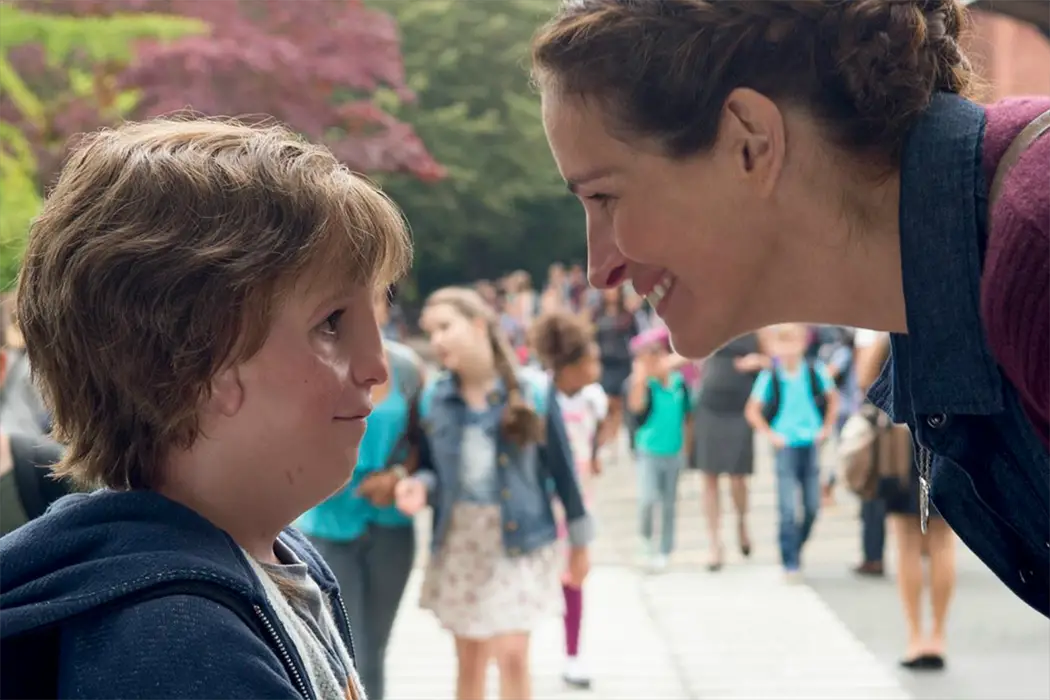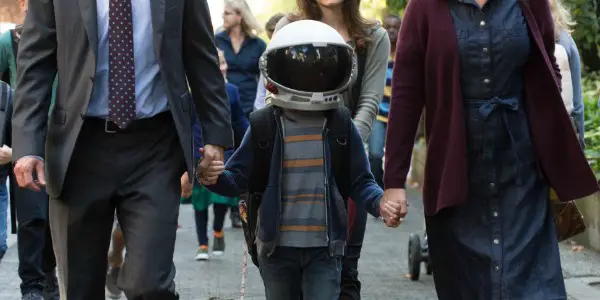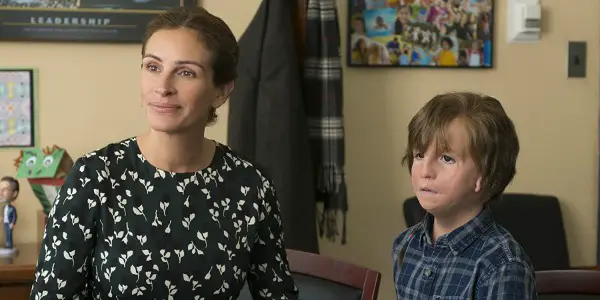WONDER: Prudent, Sincere & Perspicaciously Polycentric

Alex Arabian is a freelance film journalist and filmmaker. His…
It would be easy for one to think that Wonder may be a told centered solely from our young, deformed protagonist August “Auggie” Pullman’s (Jacob Tremblay) perspective, given its sensitive subject matter. It would be even easier for one to make the assumption that it’s a run-of-the-mill, cliché crowdpleaser aimed to tug at the viewer’s heartstrings.
Upon viewing, however, Wonder immediately establishes a different focus and tone. That isn’t to say it may not leave audiences in tears of simultaneous sadness and joy, but it won’t do so in a schmaltzy, circumventive manner. It gets right down to the raw strife of a young boy and his family trying to make it in this brutally harsh world, as much as its aimed-for PG-rating will allow for.
Writer and director Stephen Chbosky is no stranger to tackling difficult subject matters, adapting his eponymous novel The Perks Of Being A Wallflower with incredible nuance in 2012. With Wonder, he has help from Jack Thorne (How I Live Now) and Steve Conrad (creator of the relentlessly darkly comedic Amazon original series, Patriot) in adapting R.J. Palacio’s novel. Conrad in particular adds a necessary realism and just enough tonal conflict to make sure Wonder doesn’t delve into unrealistic, sympathy-begging fantasy.
Wonder is a family film, and as such, we enter Auggie’s life after he’s gone through the myriad surgeries; the audience doesn’t view the physically grueling aspects of his struggle. What we are left with is the emotional struggle and the leftover trauma that not only Auggie endures, but also that his family goes through as well. And it is often the emotional aftermath that is worse than the physical setback itself. No stone in Auggie’s world is left unturned, no person or thing left disregarded in Wonder. The bullying is surprisingly strident, far more harsh than one would expect.
Wonder makes sure to tell Auggie’s story from not only every family member’s perspective (which include their own struggles with isolation, emotional abandonment, and psychological pain), but also from his friends’, classmates’, and foes’ points of views. It is with this aspect that the film surprises the most.
A Unique Boy And His World
It doesn’t take much for viewers to read between the lines as soon as the opening credits stop rolling. Auggie’s parents, Nate (Owen Wilson) and Isabel Pullman (Julia Roberts), are petrified of sending their son to fifth grade at a school with other children; it’s the first time he won’t be homeschooled. As one could imagine, Auggie is even more apprehensive. The astronaut helmet he wears on his head signifies how vulnerable and self-conscious he is about his appearance, his facial deformity. He’s old enough to know that the world doesn’t slow down for those who are different. This notion doesn’t make it any easier for him going to school for the first time in his life as a ten-year-old.

Auggie is especially smart for his age, particularly in science. He dreams of becoming an astronaut, often daydreaming of floating in space to escape the world for brief moments: when people stare, bully him, or when he gets discouraged. Chbosky and cinematographer Don Burgess, who’s no stranger to dream arrangements (Forrest Gump, Cast Away, Spider-Man, The Polar Express, Source Code) do a wonderful job of creating these sequences.
Naturally, as with anybody his age, Auggie is inwardly focused. Add his uncommon genetic disability and it only amplifies his inwardness. Still, he remains more empathetic to those around him than most would in his situation. Tremblay plays Auggie with gut-wrenching courage, emotional weight, and a complete physical transformation beyond the makeup and prosthetics; he changes his mannerisms, vocal inflections to reflect his shyness, and his way of walking and moving about entirely.
The Varying, Intricate Perspectives
Naturally, Auggie’s whole family has shifted their lives to accommodate him. Chbosky never shies away from showing this aspect and the effects it has on each family member. His loyal sister Via (Izabela Vidovic in a breakout performance) feels, in a sense, disregarded; her parents don’t pay as much attention to her life and extracurricular activities as they do with Auggie’s. She understands why, but it doesn’t hurt her feelings any less. Her relationship with her grandmother is her most sacred bond; she holds onto it with a desperate grasp.
While Via suffers, her estranged best friend, Miranda (Danielle Rose Russell) lies and says her family situation is like Via’s in order to escape her own empty home life. It’s a complex dynamic; some people wish for different familial situations in order to escape theirs. None of this complexity was remotely hinted at in the advertising of Wonder.

Roberts as the mother who had to put her dreams of becoming an artist on hold for Auggie is typically strong. Isabel is the glue the holds the family together, but Roberts gives her room to break down, lash out, or make mistakes. Wilson as the flawed but supportive father is heartbreakingly good. I’ve never seen him in such a touching role. He brings his trademark wit and humor, but it is drowned out by a complex range of emotions and a surprising tenderness. These parents aren’t perfect, but they’re as perfect as any parent could be for Auggie. They bend over backwards while keeping it together. Chbosky even includes the family dog as a integral character in Wonder’s storyline.
Even Auggie’s friends in Wonder get their own narrations. The most insightful is that of Jack Will’s (Noah Jupe), Auggie’s best friend. At first, Jack is forced by his mother and by the principal (inhabited with overwhelming empathy by Mandy Patinkin) to befriend Auggie. He views it as a task at first. Eventually, he sees Auggie for who he really is, an amazing person with a great sense of humor and a contagiously positive way of looking at the world. Most of the other kids think Auggie has some sort of disease that is physically contagious, and so most of them avoid him.
Not The Maudlin Film You May Have Thought It Was
When the viewer consistently sees a young child with a severe deformity being not only physically assaulted by his classmates, but given numerous notes demanding that he kill himself, it will hopefully remind them that Wonder aims to portray disabilities in an astute light. Perhaps it’s Conrad and Thorne’s voices seeping in; perhaps it’s just one of Chbosky’s intended messages for Wonder that he wanted to maintain through Palacio’s adaption. Children and young teenagers at school can be unrelenting, particularly bullies. It’s that Auggie is so resilient that makes it seem like the effects of said bullying aren’t as visceral. Sure, he cries and feels like hiding and never showing his face forever, but, with his support system, he learns how to deal more readily with severe adversity.

Perhaps most surprising is the fact that Auggie’s family forces him to think about others, not just himself. It’s a difficult thing to teach a ten-year-old struggling to fit in in spite of a somewhat rigid world. The family realizes that they’ve been unintentionally ignoring Via’s life; when they do start paying attention to her, they come together stronger than before.
There are realistic verbal fights within the family as well as some rather startling incidences of bullying. Aside from the aforementioned nasty notes, even Jack succumbs to peer pressure and makes a disparaging remark about Auggie behind his back to his old friends, the bullies in Wonder. Chbosky makes the point that nobody is perfect; we all say and do things that we regret and don’t mean. It is through forgiveness that we become stronger.
Wonder: A Compelling Adaption
Though, at times, it may veer away from the main plot, Wonder’s episodic format integrates together rather seamlessly thanks to Mark Livolsi’s (Almost Famous) editing sorcery. It’s difficult to tell a story from so many different perspectives (Auggie’s, Via’s, Miranda’s, Isabel’s, Jack’s, etc.) without losing cohesiveness, but Chbosky and the team pull it off.
Perhaps what maintains the viewer’s sense of “wonder” most of all, even through all of the ups and downs Chbosky takes them through, even more-so than the dreamlike sequences forged with the help of Burgess, is Marcelo Zarvos’ score. It always remains uplifting; simple, yet powerful and emotive.
With verisimilitude, outstanding acting from its central and supporting cast, particularly that of Tremblay, and a surprisingly gritty undertone beneath the melodrama and sentient multifaceted perspectives created by Chbosky, Thorne, and Conrad’s adaption of Palacio’s novel, Wonder succeeds in creating an honest portrayal of an uncommon life situation.
What was your favorite performance in Wonder? Do you think the multiple perspectives enhanced the story or diminished it?
Wonder was released theatrically in the U.S. on November 17, 2017. For all international release dates, see here.
Does content like this matter to you?
Become a Member and support film journalism. Unlock access to all of Film Inquiry`s great articles. Join a community of like-minded readers who are passionate about cinema - get access to our private members Network, give back to independent filmmakers, and more.
Alex Arabian is a freelance film journalist and filmmaker. His work has been featured in the San Francisco Examiner, The Playlist, Awards Circuit, and Pop Matters. His favorite film is Edward Scissorhands. Check out more of his work on makingacinephile.com!













